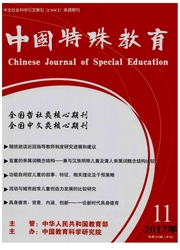

 中文摘要:
中文摘要:
该研究旨在探讨有童年期留守经历中学生的心理健康、心理弹性与主观幸福感的关系。以四所中学271名有留守经历中学生和300名无留守经历中学生为研究对象,采用主观幸福感、青少年心理弹性量表和SCL-90进行测试。结果表明,对于有留守经历的中学生,他们的心理弹性、主观幸福感和心理健康水平显著低于普通中学生;心理弹性、心理健康与其主观幸福感显著相关;心理弹性以及情绪控制、目标专注维度,心理健康的抑郁维度能显著预测主观幸福感,心理健康的抑郁维度对主观幸福感的影响在加入心理弹性后下降。结论:心理弹性在有童年期留守经历中学生的心理健康和主观幸福感之间起中介作用,即心理健康是通过心理弹性的不同方面影响了主观幸福感。
 英文摘要:
英文摘要:
This study aims to explore the relationship between the mental health,resilience and subjective well-being of secondary school students left at home in childhood,by surveying 271 secondary school students left at home in childhood and 300 secondary school students who were not left at home in childhood with the Subjective Well-Being Scale,the Scale for Chinese Adolescents’ Resilience, and the SCL-90.According to the results,the secondary school students left at home in childhood show the following:(1) they show a significantly lower level of resilience,subjective well-being and mental health than the normal students;(2) their resilience and mental health are significantly correlated with their subjective well-being;(3) their resilience,emotional control,target concentration and depression can help significantly predict their subjective well-being; their depression,added by their resilience,has a less effect on their subjective well-being.The study concludes that resilience mediates between the mental health and subjective well-being of secondary school students left at home in childhood,namely their mental health has an effect on their subjective well-being through the agency of their resilience.
 同期刊论文项目
同期刊论文项目
 同项目期刊论文
同项目期刊论文
 期刊信息
期刊信息
